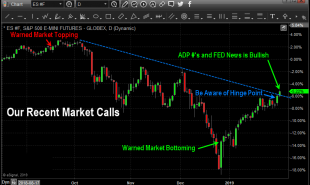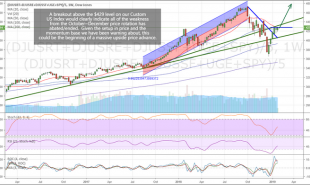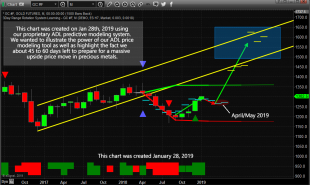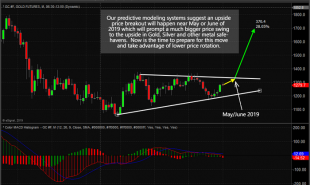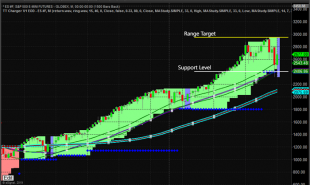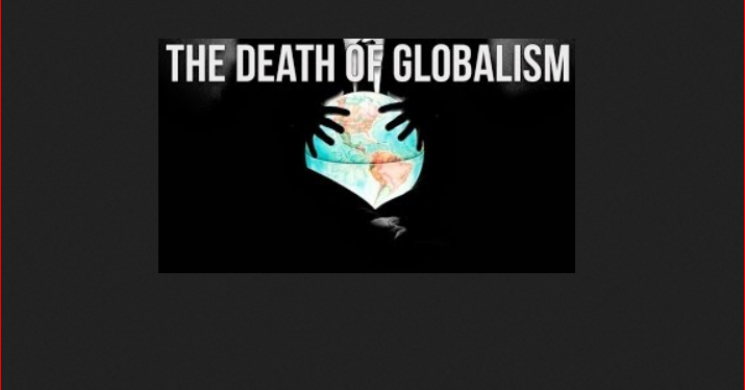
The End of Globalism: America Bows Out – The Dollar Dies
via outsiderclub.com
After demanding the spotlight for decades, America is exiting the world stage.
It’s not a graceful exit, either.
It’s the exit of a tempestuous diva, storming back behind the curtain while back-up singers carry on awkwardly, angrily, and unnerved.
If you don’t believe me, just take a look at what Canada’s foreign minister, Chrystia Freeland, had to say on Tuesday:
“The fact that our friend and ally has come to question the very worth of its mantle of global leadership, puts into sharper focus the need for the rest of us to set our own clear and sovereign course.”
Basically, Freeland is saying (on behalf of Canada) that America doesn’t want to lead anymore, that it can’t be trusted to, and that it’s abdicated its responsibilities and privilege.
And she’s not wrong.
Donald Trump’s foreign policy has been decidedly insular ever since his early campaign days. And since getting elected, he’s gone out of his way to insult and alienate every single one of America’s closest allies.
That’s not an exaggeration, either. Since ascending to the office, Donald Trump has rankled, befuddled, and angered Mexico, Canada, England, France, Germany, Australia, and more.
So much so, in fact, that these countries no longer consider the United States a keeper of the world order.
Now, maybe you think that’s a good thing; or maybe you think it’s a bad thing.
Maybe you’re glad that the United States is returning to its more isolationist roots. Or you may think globalism provides peace and stability.
Honestly, whatever you believe is fine.
I just want to make you aware of two things:
1. The American-led world order is ending.
2. It’s going to have profound consequences.
Remember, this is the same global order that positioned America as the world’s only superpower and the foundation of the global economy.
Undoing that order will result in a period of extreme instability. It will mean progress in some areas and retrenchment in others.
What we’re talking about is bigger than any other investment trend that can be conceived.
A new world order is bigger than pot stocks, crypto-currencies, or any fancy new-wave technology. The death of the dollar will be a years-long phenomenon that will alter the fabric of our society.
And I’m not going to lie, explaining it is going to take a bit of time.
So if you want me to cut to the chase, it’s this…
The dollar is dead. Buy gold.
That’s really all you need to know.
But if you want to know more about the death of the NWO, the dollar, and the United States as a superpower, then by all means read on...
The End of the NWO
In his influential book on U.S. power, Liberal Leviathan, Princeton professor G. John Ikenberry says the following:
“By binding itself to other states within a system of rules and institutions, the leading state makes its power more acceptable to other states, creating incentives for support rather than opposition.”
This is the crux of American power of the past 70 years. In the aftermath of WWII, institutions were erected, consolidated, and entrenched with the United States at the head of the table, so to speak.
The United Nations, NATO, the World Bank, and the International Monetary Fund are prime examples of that.
Well, in that time, every single U.S. president has sought to strengthen and exploit those institutions…
Except Donald Trump.
Trump is the first president in modern history to abandon the world order that’s made America the key cog in issues social, political, and economic.
He’s dismissed NATO as “obsolete” and refused to reaffirm U.S. commitment to the decades-old alliance. He called the WTO a “disaster”. He’s hammered NAFTA and free trade agreements.
“We will no longer surrender this country or its people to the false song of globalism,” Trump said during a speech in Washington. “I am skeptical of international unions that tie us up and bring America down… We will never enter America into any agreement that reduces our ability to control our own affairs. The nation-state remains the true foundation of happiness and harmony.”
Our allies are obviously unnerved by this.
Hence Canada’s aforementioned rebuttal.
“We will robustly support the rules-based international order, and all is institutions, and seek ways to strengthen and improve them,” Foreign Minister Freeland said. “We will strongly support the multilateral forums where such discussions are held — including the G7, the G20, the OAS, APEC, the WTO, the Commonwealth and La Francophonie, the Arctic Council, and of course, NATO and the UN.”
Again, the implication is that Canada will champion these institutions, because the United States won’t.
It’s a sentiment that’s now being echoed by other American allies around the world.
“The times in which we can fully count on others are somewhat over, as I have experienced in the past few days,” German Chancellor Angela Merkel said after Trump’s recent visit to Europe. “We need to know we must fight for our own future as Europeans for our destiny.”
Other criticisms were more pointed. They went beyond the assertion that America is no longer a reliable ally to suggest America is now a threat to European, or even world, prosperity.
"Anyone who accelerates climate change by weakening environmental protection, who sells more weapons in conflict zones, and who does not want to politically resolve religious conflicts is putting peace in Europe at risk," said German Foreign Minister Sigmar Gabriel. "The short-sighted policies of the American government stand against the interests of the European Union. The West has become smaller, at least it has become weaker."
Following that trip to Europe, where Trump called the Germans “bad, very bad” for selling cars in the United States, the president unilaterally withdrew the United States from the Paris climate change agreement.
This further agitated allies and damaged U.S. credibility. The United States is now one of just three countries not taking part in the agreement — the other two being Nicaragua and Syria. That’s it. Even North Korea signed on.
Again, the world’s leading superpower and architect of the international order walked out of an agreement with near-universal global support. And it did so abruptly, with little or no consideration.
The decision so rankled France that its president, Emmanuel Macron, addressed the American public directly in a video. First he criticized the decision as a “mistake for the U.S. and our planet.” Then, he actively tried to court U.S. citizens to come take jobs in France.
“To all scientists, engineers, entrepreneurs, responsible citizens who were disappointed by the decision of the President of the United States, I want to say they will find in France a second homeland,” Macron said. “I call on them, come and work here with us, to work together on concrete solutions to our climate, our environment. I can assure you France will not give up the fight.”
Finally, last weekend, Trump used an act of terror to criticize the mayor of London, Sadiq Kahn, on Twitter.
 The Mayor of London now says the President of the United States should no longer be welcome in the United Kingdom.
The Mayor of London now says the President of the United States should no longer be welcome in the United Kingdom.
“I don’t think we should roll out the red carpet to the president of the USA in circumstances where his policies go against everything we stand for,” said Khan.
To have the mayor of London say the President of the United States is not welcome in England is a major break from historical norms.
It’s clearly the end of an era, and the start of a new.
The Death of the Dollar
The oft-repeated refrain has long been “America first.” But really, it ought to be “America first, last, and only.” Donald Trump is not at all concerned with what America can do for the world, but rather obsessed with what the world can do for America.
That doesn’t ingratiate America to the global community; it isolates it. And to Professor Ikenberry’s point above, a superpower that lacks the support of the global community ceases to be a superpower.
As I mentioned at the top, that means less responsibility, but also less privilege.
That’s where things like U.S. debt and the dollar come in.
I mean, think about it…
Are you going to keep lending money to a country that feels no obligation to pay you back?
This is a fear Donald Trump himself stoked last year.
"First of all, you never have to default,” he said, “because you print the money, I hate to tell you, OK?"
And a few months later: “I would borrow, knowing that if the economy crashed, you could make a deal. And if the economy was good, it was good. So, therefore, you can’t lose.”
These are direct quotes. This is Donald Trump’s plan. If America bites off more debt than it can chew, Donald Trump would “print the money,” or “make a deal” to pay creditors less.
That is not the kind of credibility that bolsters the U.S. dollar. It’s actually a pretty dangerous way of thinking. But that’s also how Donald Trump ran his businesses.
Bankruptcy is his business strategy. And the United States is carrying $20 trillion in debt with a debt-to-GDP ratio of 105%.
Why should anyone believe we intend to pay it?
And if America can’t be trusted as a debtor, why should it be trusted as the steward of the global economy?
Furthermore, like the dollar, institutions like the World Bank, WTO, and IMF will lose their credibility just as the United States and the dollar do. That opens the door for new competitors to take their place.
Indeed, Brazil, Russia, China, India, and South Africa have already launched competing institutions in the form of the New Development Bank (NDB) and the Contingent Reserve Arrangement (CRA). China has launched a gold exchange in Shanghai to compete with London and Wall Street. And countries around the world have signed billions of dollars worth of currency swaps, allowing them to trade without using the U.S. dollar as a proxy.
Basically, Donald Trump’s presidency is rapidly accelerating the death of the dollar. What was once thought to be decades away could be just years in the offing.
America is retreating from the world stage. Its credibility is fading fast. Resentment among other nations is growing. Our rivals are emboldened. And things are only going to get worse from here.
So buy gold.
I don’t care what the dollar does in the short term. I don’t care what the Fed says about rates.
Buy gold and keep buying it.
Read more by Soren K.Group


